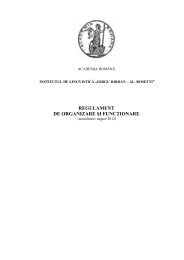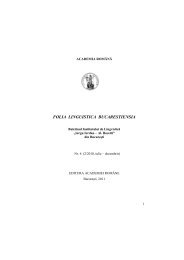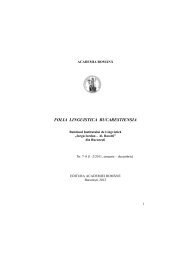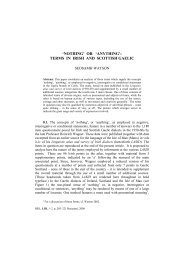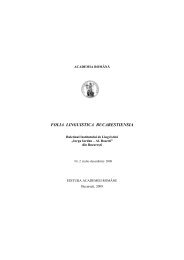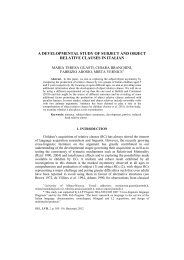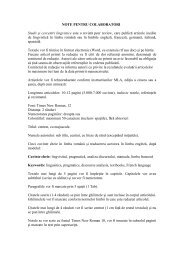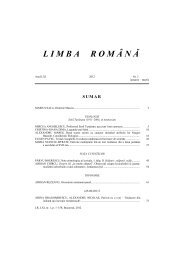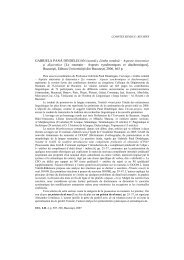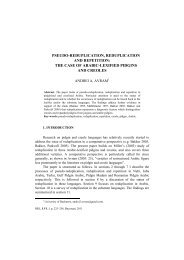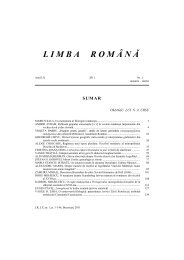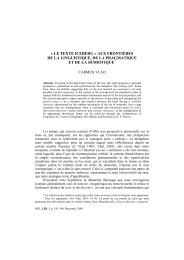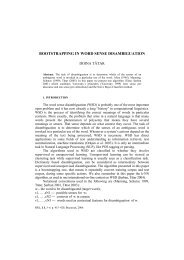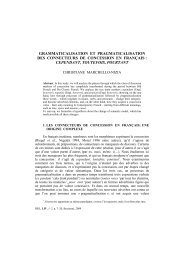You also want an ePaper? Increase the reach of your titles
YUMPU automatically turns print PDFs into web optimized ePapers that Google loves.
302<br />
Ian Hancock<br />
At the present time, there are sufficient numbers of speakers to ensure that, if<br />
steps are taken, the language may not become extinct for some generations to<br />
come. Such steps would initially necessitate the establishment of parochial schools<br />
− at least at primary level such as already exist for other language groups such as<br />
the Tamils and Chinese, to promote literacy in the Creole as well as providing the<br />
regular Malaysian educational curriculum.<br />
To provide some idea of the present state of the language, the following<br />
passages are given, with interlinear word-for-word translation and a free translation<br />
following.<br />
(1) The first selection, the beginning of a fairly long folktale, was collected<br />
by the writer in Malacca. The title, which is in Malay, means “H’m! I<br />
know!”:<br />
Hem! Aku tahu!<br />
Ngwă díă teng ngwă krénsă. Ísi krénsă bomóng prigăsózu.<br />
One day is one child. This child very lazy.<br />
Ngkă bai skólă. Éli-să mai mandá kwéli (= ku éli) bai skólă,<br />
Not go school. His mother send (to) him go school,<br />
el nggére. Éli kuré champurá ránchu, bai nalá-nalí, nádă<br />
he not-want. He run mix friends, go there-here, nothing<br />
sibrísu nté. Éli-să mai falá kwéli, ‘kántu bos ngkă bai<br />
work not-have. His mother say to-him, ‘if you not go<br />
skólă, yo 1o’ fazé kukís mpóku bendé. Ell-să mai ja fazé<br />
school, I (fut.) make cake few sell’. His mother (past) make<br />
síngku góreng písang mazánti, falá kwéli bai bendé.<br />
five fried banana at first, say to-him go sell.<br />
Eli ja tomá ísi síngku góreng písang, éli ja bai.<br />
He (past) take these five fried banana, he (past) go.<br />
Eli ja sai di káză, ja bai bendé. Ja bai túdu bándă;<br />
He (past) leave house, (past) go sell. (past) go all place,<br />
nggéng nggére komprá. Eli lo’ bai útu bándă, ja ngkónta<br />
nobody not-want buy. He (fut.) go other place, (past) meet<br />
ngwă bélu, básu di álbi. Ísi bélu falá kwéli, ‘bos keng<br />
one old man, under tree. This old man say to-him, ‘you who<br />
ta bendé, beng nakí la’. El ngkă falá nádă. Bélu falá toná,<br />
selling, come here lah’. He not say nothing. Old man say again,<br />
‘beng, yo olá’. Éli olá ta bendé síngku góreng písang. Ísi<br />
‘come, I see’. He see selling five fried banana. This<br />
bélu falá kwéli, ‘bos keré fiká ríku ka’. Éli falá ki-sórti<br />
old man say to-him, ‘you want be rich’ He say how<br />
fiká ríku. Ísi bélu falá ‘bos ubí, yo ki ta falá ku bo, bos<br />
be rich. This old man say ‘you hear, I who speaking to you, you



